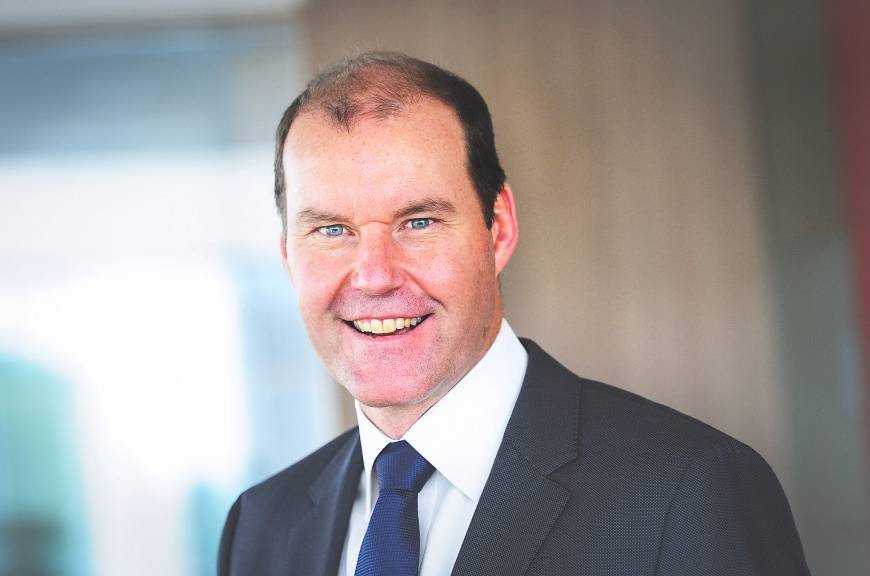After $62 billion Shire win, Takeda CEO faces more headaches
Weber is overseeing a dramatic makeover that will reshape Takeda into a global powerhouse but also leaves him with a pile of debt.
Change Size
 Takeda Pharmaceutical CEO Christophe Weber (Bloomberg/File photo)
Takeda Pharmaceutical CEO Christophe Weber (Bloomberg/File photo)
T
akeda Pharmaceutical Co.’s Chief Executive Officer Christophe Weber navigated rebuffs, critics and a plunging stock price to win a US$62 billion deal to acquire larger rival Shire Plc.
Integrating the Japanese drugmaker -- which began by selling herbal therapies 237 years ago -- with the sprawling American company will be even more complicated.
As the Osaka-based company’s first foreign head, Weber is overseeing a dramatic makeover that will reshape Takeda into a global powerhouse with a plum suite of drugs for rare diseases. But it also leaves him with a pile of debt, and the task of bringing together two companies of different sizes, cultures and areas of focus in the drug industry.
“It will go through,” Mick Cooper, a health-care analyst at Trinity Delta in London, said about the deal. “But the challenge for Christophe Weber is now making sure the integration is done properly, done quickly and efficiently to make it a success. Otherwise you’ll have created a Japanese powerhouse that might not be remembered for the right reasons.”
Takeda investors were lukewarm on the news, with shares dropping as much as 4.9 percent in early trading in Tokyo on Wednesday before trading 2.7 percent lower at 1:53 p.m. local time. Shire’s stock jumped 4.6 percent in London trading Tuesday.
Takeda secured a bridge loan facility of about $31 billion to help pay for its purchase of Shire, in what likely is the largest borrowing ever by a Japanese company for an acquisition.
Weber said Tuesday he would consider selling some assets, and would pay down debt with the combined company’s increased profits and cash resources. In an interview, Weber said that the drugmaker will generate “a very significant cash flow, and that’s also part of the equation.”
Takeda said pretax cost savings will reach at least $1.4 billion annually by the end of the third fiscal year, topping the expectations of some analysts. The company said the deal would add to earnings in its first fiscal year after completion.
The deal comes at a time when Takeda faces drug-pricing pressures at home and as it has few promising experimental therapies of its own.
“The two combined pipelines create a rich pipeline in all stages -- early and late stage, which is very important,” Weber said on a conference call, adding that the American company would help boost Takeda’s global footprint. Shire’s lineup of medicines for rare diseases will add to Takeda medicines like Entyvio for gastrointestinal conditions.
When Takeda’s interest was first announced on March 28, the Japanese company’s shares plunged even as Shire’s surged, giving it a larger market value than its acquirer. Many argued that the financing would be hard to come by.
Shire spurned four offers from the Japanese company. But ultimately Weber prevailed, getting the bank loans and the backing of Shire’s board.
Takeda has had mixed success with previous acquisitions. Its 2008 purchase of Millennium Pharmaceuticals brought in a string of new medicines. But Ariad Pharmaceuticals Inc., which it bought last year, is set to face heavy competition in oncology, while its 2011 purchase of Nycomed A/S was an expensive way to get exposure to emerging markets, Morningstar analyst Karen Andersen said.
There’s also the challenge of integrating Shire, which has itself been dealing with the difficulties of folding in the operations of Baxalta after buying it for about $32 billion in 2016. While the deal gave Shire a large franchise in hemophilia, it has failed to live up to expectations.
Flemming Ornskov, Shire’s CEO and the architect of its expansion, will lead the company through the closing of the Takeda deal, according to the announcement of the transaction.
Weber, 51, has long shown a willingness to jump into difficult situations. The Frenchman took the Takeda job despite early pushback from Japanese investors who were reluctant to have a foreign CEO.
“I’m not at all an aggressive dealmaker,” Weber said in the interview. “You can say I am an aggressive partner.”
A former mountaineer, Weber grew up in the Alps near Geneva and has credited his youth for helping build strength of character. He was 15 and with his father when he died in an avalanche, he wrote in newspaper columns last year. That and the death of a younger brother helped shape him, he said.
Many Japanese acquisitions abroad have gone sour as firms sought out targets with little regard to valuation or corporate cultures. Kirin Holdings Co. last year sold its Brazilian operations to Heineken NV for about $706 million, less than a quarter of the $3.9 billion the company purchased it for in 2011. Yet for many Japanese companies, cross-border deals remain attractive amid a slowing home market.
“Takeda didn’t have pipelines and there was no solution after their current main products got off patent,” said Naoki Fujiwara, chief fund manager for Shinkin Asset Management Co., which according to Bloomberg data holds Takeda shares. “It was an option between waiting for a gradual decline or taking a risk and seeking growth.”









